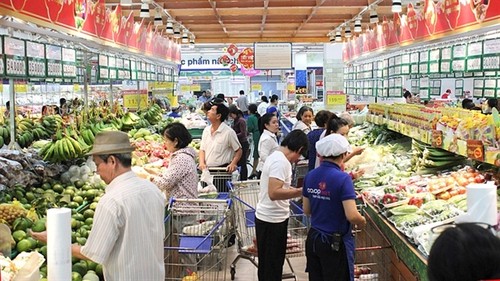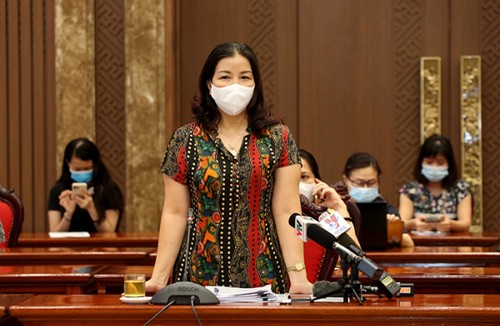 Vietnam’s retail sales of goods in October are up 2.5% month on month. (Photo: tapchitaichinh.vn) Vietnam’s retail sales of goods in October are up 2.5% month on month. (Photo: tapchitaichinh.vn) |
The pandemic has reduced spending on non-essential goods and entertainment.
Over the past nine months, total retail sales of consumer goods and services fell more than 7%. Retail revenue of goods alone shrank an estimated 3.38%.
COVID-19 has forced businesses to adapt to new consumer trends by finding new models of production, distribution, transportation, and sales.
Vu Vinh Phu, a trade expert, said to stimulate the domestic market it’s necessary to develop a planned production and distribution system, promote supply-and-demand connectivity, and create links between businesses and localities to support product sales.
“In the short term, it’s necessary to set up several production and distribution chains to divide profits and manage quality and strategic systems to store essential goods. We also need to strengthen the quality management in the value chain and strategic stockpiles to reduce transportation costs. More attention should be given to controlling the market, combating smuggling and commercial fraud, and organizing the distribution system to create links in the value chain,” said Phu.
 Tran Thi Phuong Lan, Acting Director of Hanoi’s Department of Industry and Trade (Photo: VOV) Tran Thi Phuong Lan, Acting Director of Hanoi’s Department of Industry and Trade (Photo: VOV) |
Tran Thi Phuong Lan, Acting Director of Hanoi’s Department of Industry and Trade, underscored the importance of increasing the connectivity of production and distribution chains, supply and demand, and trade among provinces and cities.
She said Hanoi will stimulate domestic consumer demand and expand the domestic market to boost production and trade and restore economic growth.
“We’re making plans for the upcoming New Year and Lunar New Year in Hanoi that will respond to pandemic developments and stimulate sales programs to raise Hanoi’s sales and service revenue. We’ll continue to coordinate with the Ministry of Industry and Trade to keep track of the pandemic situation in other countries and their response measures to look for export outlets while also promoting e-commerce,” said Lan.
Nguyen Thi Minh Huyen, Deputy Director of the E-Commerce and Digital Economy Department of the Ministry of Industry and Trade, stressed the importance of promoting goods consumption in the domestic market, and encouraging businesses and farm households to use e-commerce platforms.
She insisted on the need to use both modern and traditional distribution methods to connect supply and demand, ensure goods delivery, and foster economic growth.
According to Huyen, “Combining modern and traditional distribution methods has proved an important way in this new normal period to boost the sales of agricultural products through e-commerce channels. Businesses should develop digital transformation and goods delivery strategies, embrace e-commerce applications, and participate in programs that can help them take maximum advantage of e-commerce.”
 Deputy Minister of Industry and Trade Do Thang Hai Deputy Minister of Industry and Trade Do Thang Hai |
Deputy Minister of Industry and Trade Do Thang Hai says the Ministry will keep a close eye on supply and demand and the price of essential commodities and promptly enact necessary regulatory measures.
It will also coordinate with other ministries and localities to facilitate the smooth delivery of goods nationwide and support promotional activities.
“Retail sales of goods and services will increase 3 to 4% this year. From now to the end of the year, the Ministry will focus on removing production and trading obstacles, especially for large businesses, to restore production as quickly as possible, maintain supply chains, and take advantage of the sharp year-end rise in consumer demand to recover the losses of the pandemic period,” said Hai.
It’s time for Vietnam’s 100 million people to embrace the campaign "Vietnamese people give priority to Vietnamese goods" to help businesses recover and grow in this new normal period.